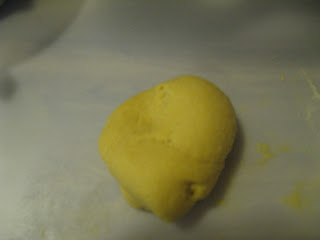That’s my sorry verdict on my first pasta making attempt. Here's the story.
My friend Joseph, a Personal Chef and one of the chefs at the CIA in St. Helena, was among the folks sharing a glass or three of wine in honor of a friend’s birthday a while back. We were chatting about cooking matters, and he gave me a pasta making challenge. I told him I didn’t own a pasta maker, and he said I didn’t need one. This is the recipe Joseph gave me:
1 cup semolina flour
2 eggs
Pinch of salt
He told me to mix, knead, and roll out the dough as flat as possible, cut and cook for a short period of time.
Joseph was – intentionally I'm sure – vague about any additional instruction. I think he wanted me to learn stuff for myself.
I confess I did consult a few cookbooks for guidance. None of them contained Joseph’s exact recipe. However, they all generally discussed kneading the dough (5-8 minutes), rolling the dough out, and cutting it or putting itthrough the pasta machine.
So here is what I did.
I measured 1 cup semolina flour, and got out two eggs. I threw a pinch of Kosher salt into the flour. I beat up the eggs with a fork.

I poured the beaten eggs into the flour. At first, I mixed the eggs into the flour with the fork. Once it was pretty much blended, I turned the dough out onto a lightly floured plastic sheet and began kneading. After some kneading and adding small (very small) amounts of flour, the dough stopped sticking to my hands. I found it very difficult to work, and it felt tough and very un-pliable to me. Here is my dough after about 8 minutes of kneading. Looks tough, doesn't it?
I rolled the dough out as best I could. It was very difficult to do. Getting the dough to budge took all my strength, including leaning on the rolling pin with my elbows. I couldn’t roll it out any larger than this. The sheet was, I would estimate, 1/8 inch thick.
I cut the dough into very thin little strips about the size of linguine with my sharpest paring knife.
However, I may as well not have done this, since I realized once it was time to pop the pasta into the boiling water that it was stuck to the plastic board. I had to pry it up with a knife, and the effect of all my carefully cut almost perfect little strips was lost.
I didn’t want to overcook it (I wonder if it would have mattered); the mess boiled somewhere between 2 and 4 minutes.
Well as I say, the result was, sadly, pretty inedible. It tasted like polenta and that was fine, but the texture was hard and rubbery.

What went wrong? Clearly the problem occurred in the mixing or kneading stages. I intentionally didn't consult any pasta making videos before my attempt, but I have done so since (and I did find something very close to Joseph's recipe), and the texture of the dough in the videos was very different from mine - much softer. If I had to speculate, I’m guessing either I worked the flour into the eggs too quickly, or there was perhaps a bit too much flour, or perhaps it was something about the temperature of the eggs (they were straight from the fridge), or perhaps all of the above.
So it was an amusing little experiment (fortunately it didn’t take long), and I’ll be going back to Joseph for a good laugh and, finally, some real instructions.
Or better yet, I’ll see if I can convince him to give me and some of my friends an in-person lesson, because I have a feeling that this is one of these cooking techniques I have to watch, preferably in person, in order to learn.
So stay tuned for the next installment of pasta making experimentation. We have only one direction to go, my friends, and that is up!
All my pasta making friends out there - give me some advice in the comments, I beg you!
P.S. The pesto I made to go with this pasta was killer – and the pesto, at least, has not gone to waste!








